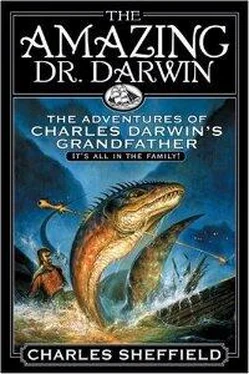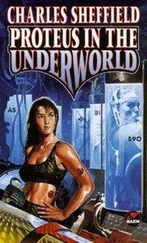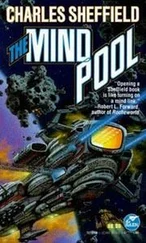His thoughts were interrupted by a low, fluting whistle, sounding through the fog. It seemed to come from his left, and a good distance below him. The mist made distance and direction difficult to judge. He held his breath and stood motionless, listening intently. After a few seconds it came again, a breathy call that the fog swallowed up without an echo.
Leaving the path, he moved down and to the left, stumbling over the sodden tussocks of grass and clumps of heather, and peering ahead into the darkness. Twice, he almost fell, and finally he stopped again. It was no good, he could not negotiate the side of Cross Fell in the darkness and mist. Exploration would have to wait until conditions were better, despite his desperate anxiety. The only thing to do now was to return to the house. He would rest there as best he could, and be fit for another ascent, with assistance, when weather and light permitted it. Whatever had happened to Anna, it would not help her if he were to suffer injury now, up on the fell. He began a cautious descent.
At last he saw the light in the upper bedroom of the house shining faintly through the mist below him. Down at ground level, on the left side of the house, he fancied that he could see a group of dim lights, moving in the kitchen garden. That was surprising. He halted, and peered again through the darkness. While he watched, another low whistle behind him was answered, close to the house. The lights grew dimmer.
He was gripped by a sudden, unreasoning fear. Heedless of possible falls, he began to plunge full-tilt down the hillside.
The house and garden seemed quiet and normal, the grounds empty. He made his way into the kitchen garden, where he had seen the moving lights. It too seemed deserted, but along the wall of the house he could dimly see three oblong mounds. He walked over to them, and was suddenly close enough to see them clearly. He gasped. Side by side, bound firmly to rough stretchers of wood and leather, lay the bodies of Darwin, Pole and Anna, all well wrapped in sheepskins. Anna’s cold forehead was heavily bandaged, with a strip torn from her linen blouse. Thaxton dropped to his knee and put his ear to her chest, full of foreboding.
Before he could hear the heartbeat, he heard Darwin’s voice behind him.
“We’re here, are we?” it said. “About time, too. I must have dropped off to sleep again. Now, Richard, give me a hand to undo myself, will you. I’m better off than Anna and Jacob, but we’re all as sick as dogs. Myself, I don’t seem to have the strength of a gnat.”
* * *
“What a sight. Reminds me of the field hospital after a Pathan skirmish.” Jacob Pole looked round him with gloomy satisfaction. The study at Heartsease had been converted into a temporary sickroom, and Darwin, Anna Thaxton and Pole himself were all sitting in armchairs by the fire, swaddled in blankets.
Richard Thaxton stood facing them, leaning on the mantelpiece. “So what happened to Jimmy?” he said.
“I don’t know,” said Darwin. He had broken one of his own rules, and was drinking a mug of hot mulled wine. “He started out with us, leading the way down while the rest of them carried the stretchers. Then I fell asleep, and I don’t know what happened to him. I suspect you’ll find him over in Milburn, wherever he usually lives there. He did his job, getting us back here, so he’s earned a rest.”
“He’s earned more than a rest,” said Thaxton. “I don’t know how he did it. I was up on the fell myself in that fog, and you couldn’t see your hand in front of your face.”
“He knows the fell from top to bottom, Jimmy does,” said Anna. “He was almost raised there.” She was looking pale, with a livid bruise and a long gash marring her smooth forehead. She shivered. “Richard, you’ve no idea what it was like, following him through the dark in that tunnel, then suddenly coming across the fiends. It was like a scene out of hell—the smoke, and the shapes. I felt sure they had killed the Colonel and Dr. Darwin.”
“They hardly needed to,” said Pole wryly. “We came damned close to doing that for ourselves. Erasmus nearly drowned, and I caught the worst fever that I’ve had since the time that I was in Madagascar, looking for star sapphires. Never found one. I had to settle for a handful of garnets and a dose of dysentery. Story of my life, that. Good thing that Erasmus could give me the medicine, up on the fell.”
“And that was no thanks to me,” said Darwin. “The fiends saved you, not me. They seem to have their own substitute for cinchona. I’ll have to try that when we get back home.”
“Aye,” said Pole. “And we’ll have to stop calling them fiends. Though they aren’t human, and look a bit on the fiendish side—if appearances bother you. Anyway, they did right by me.”
Richard Thaxton dropped another log on the fire, and pushed a second tray of meat pasties and mince pies closer to Darwin. “But at least there are fiends on Cross Fell,” he remarked. “Anna was right and I was wrong. It was a hard way to prove it, though, with the three of you all sick. What I find hardest to believe is that they’ve been there in the mines for fifteen hundred years or more, and we’ve not known it. Think, our history means nothing to them. The Norman Conquest, the Spanish Armada—they mean no more to them than last year’s rebellion in the American Colonies. It all passed them by.”
Darwin swallowed a mouthful of pie and shook his head. “You’re both wrong.”
“Wrong? About what?” asked Thaxton.
“Jacob is wrong when he says they are not human, and you are wrong when you say they’ve been up in the mines for fifteen hundred years.”
There was an immediate outcry from the other three. “Of course they’re not human,” said Pole.
Darwin sighed, and regretfully put down the rest of his pie, back on the dish. “All right, if you want evidence, I suppose I’ll have to give it to you. First, and in my opinion the weakest proof, consider their anatomy. It’s different from ours, but only in detail—in small ways. There are many fewer differences between us and the fiends than there are between us and, say, a monkey or a great ape. More like the difference between us and a Moor, or a Chinee.
“That’s the first point. The second one is more subtle. The flea.”
“You’d better have some proof more substantial than that, Erasmus,” said Pole. “You can’t build a very big case around a flea.”
“You can, if you are a doctor. I found a flea on one of the young females—you saw her yourself, Jacob.”
“If she’s the one you were hoping to roger, Erasmus, I certainly did. But I didn’t see any flea. Of course, I didn’t have the privilege of getting as close as you apparently did.”
“All the same, although you didn’t see it, I found a flea on her—our old friend, Pulex irritans , if I’m a reliable judge. Now, you scholars of diabolism and the world of demons. When did you ever hear of any demon that had fleas—and the same sort of fleas that plague us?”
The other three looked at each other, while Darwin took advantage of the brief silence to poke around one of his back teeth for a piece of gristle that had lodged there.
“All right,” said Anna at last. “A fiend had a flea. It’s still poor evidence that fiends are human . Dogs have fleas, too. Are you suggesting they should be called human? There’s more to humanity than fleas.”
“There is,” agreed Darwin. “In fact, there’s one final test for humanity, the only one I know that never fails.”
The room was silent for a moment. “You mean, possession of an immortal soul?” asked Richard Thaxton at last, in a hushed voice.
Jacob Pole winced, and looked at Darwin in alarm.
Читать дальше












